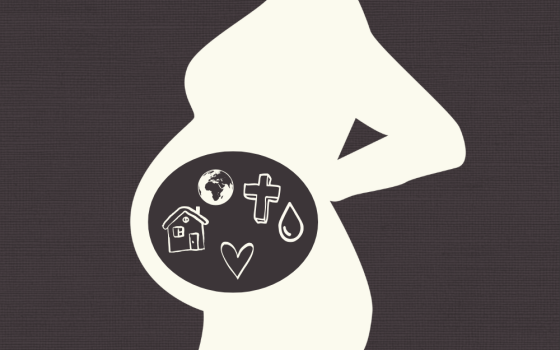
Dozens spoke about gender-based violence during the 69th session of the United Nations' Commission on the Status of Women, held March 10-21 in New York. (GSR graphic/Olivia Bardo)
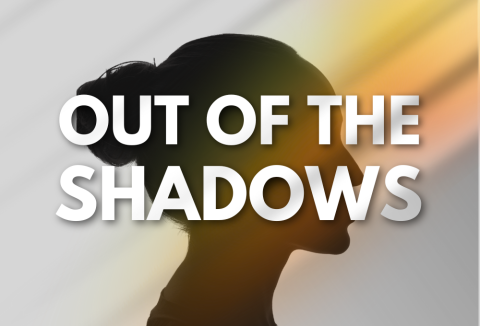
(GSR logo/Olivia Bardo)
During Women's History Month this March, Global Sisters Report launched "Out of the Shadows: Confronting Violence Against Women," a yearlong series on the ways Catholic sisters are responding to this global phenomenon.
When discussing possible topics to focus on for 2025, gender-based violence kept cropping up in conversations. Sisters worldwide confront this issue, ministering to victims of human trafficking, child marriage, sexual and spiritual abuse, and more. So far this year, we've told the stories of women in Kenya, Spain, Sri Lanka, Vietnam, Japan, the Philippines, Nepal and Democratic Republic of Congo.
This week, we wanted to pause midway through this special series to remind readers of the memorable stories and columns we've already published and call attention again to the extraordinary work of sisters contending with gender-based violence.
International correspondent Chris Herlinger started the series with a look at the 69th session of the United Nations' Commission on the Status of Women, held March 10-21. The session focused on the 30th anniversary of the 1995 Beijing Declaration and Platform for Action, which was adopted by 189 countries and remains a milestone in the quest for gender equality.
"We know that societies benefit with gender parity and empowered women," Adrian Dominican Sr. Patricia McDonald said during a March 11 event focused on the importance of women's empowerment. When that happens, McDonald said, societies "tend to have less gender-based violence, including sexual harassment and domestic violence."
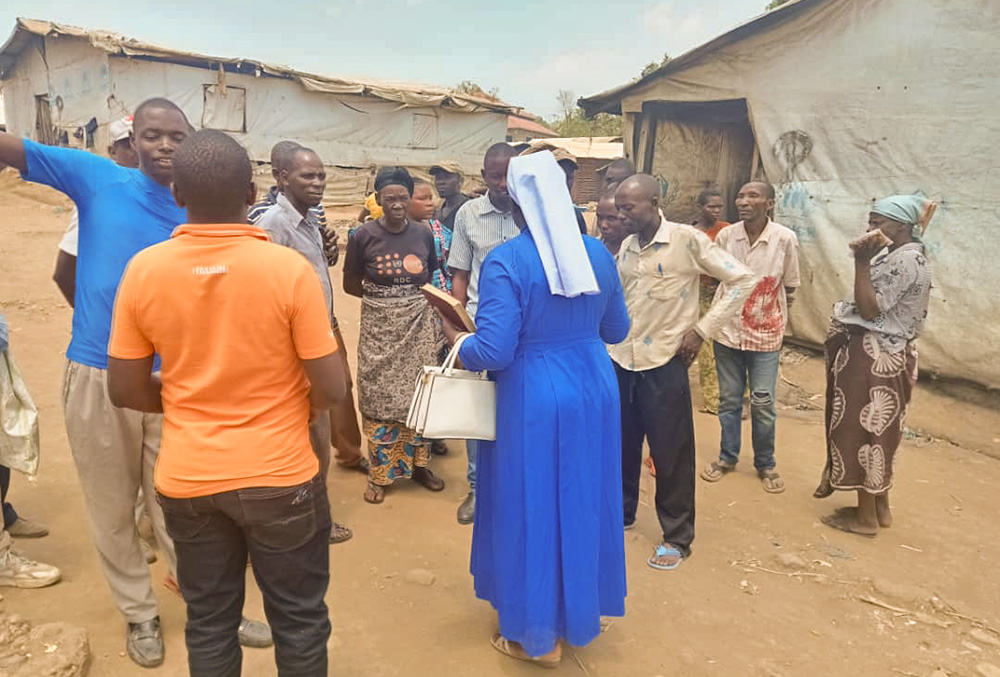
A sister visits displaced individuals, including women and girls, in a camp in the eastern town of Goma, Democratic Republic of Congo. (Courtesy of Caritas)
Africa and Middle East correspondent Doreen Ajiambo traveled to Central Africa and interviewed victims of the decadelong war in the Democratic Republic of Congo, as well as the Catholic sisters who work to care for the people trapped in this conflict-ridden area.
The United Nations has reported "serious violations of international law involving the targeting of women and children in situations of armed conflict in the DRC including killing and maiming, sexual violence, abduction, and forced displacement."
Ajiambo also reported from Kenya about a "brutal wave of violence" inflicted upon older widows.
"Accused of witchcraft, many are attacked, displaced or even killed by relatives or others seeking to seize their land or eliminate them from inheritance chains," Ajiambo wrote. "What might appear on the surface as cultural belief is, in many cases, a form of gender-based violence targeting vulnerable women under the guise of tradition."
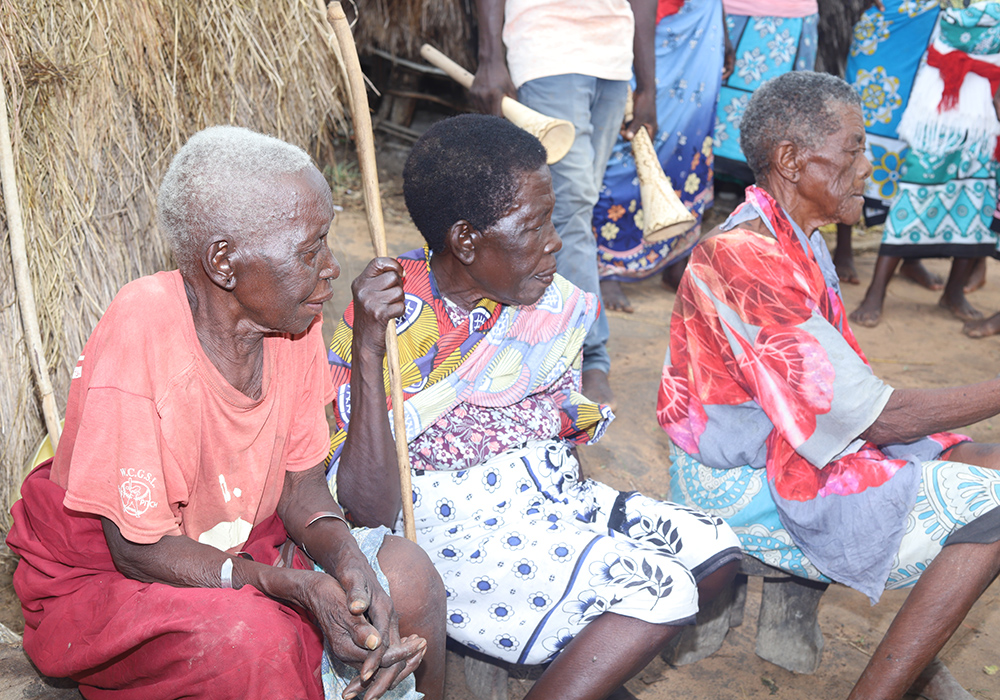
Elderly women evicted from their homes for witchcraft accusations seek refuge at a center in Kilifi, a coastal town in Kenya, on April 24, 2025. (GSR photo/Doreen Ajiambo)
Columns editor Benedictine Sr. Helga Leija wrote about the survivors of Spain's Patronato de Protección a la Mujer.
The Patronato de Protección a la Mujer, or Women's Protection Board, was reinstated by dictator Francisco Franco's regime in 1941 and operated under the authority of the Catholic Church.
"Its goal was to 'save' women deemed morally deviant: rebellious teens, single mothers, orphans, abuse survivors, or simply women that did not fit the era's definition of decency — or rather, what Franco's regime and the church determined as such," Leija wrote.
In June, the Spanish Conference of Religious held a public event to apologize and seek forgiveness from the women who suffered in institutions run by the patronato. But many survivors attending that day rejected the apologies with cries of "Truth, justice, and reparation" and "Not forgotten, not forgiven."
"Those who haven't been hurt in this way would never understand that sometimes, forgiveness hurts more than the original offense, especially when it is requested without addressing the underlying wounds," Leija wrote.
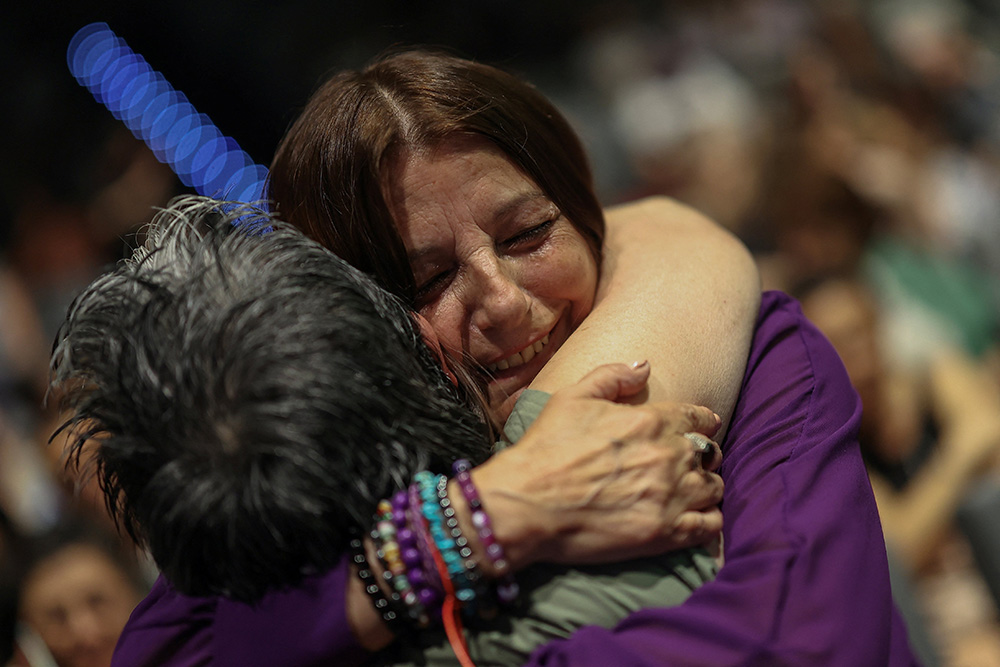
Consuelo Garcia del Cid, 66, a survivor and advocate for the cause, hugs an assistant before a ceremony in Madrid June 9, 2025, by the Spanish Confederation of Religious Entities to apologize to the survivors of Catholic moral rehabilitation institutes in Spain, where thousands of women and girls suffered harsh treatment during Francisco Franco's dictatorship. (OSV News/Reuters/Juan Medina)
In a column, Sr. Yolanda Olivera addresses the systemic nature of abuse within the Catholic Church. Olivera, a Franciscan Missionary of the Mother of the Divine Shepherd, confronted this abuse as part of the Care and Protection team of the Diocese of Roraima, Brazil. She led "training sessions on abuse prevention, healthy relationships, civil and canon law, and procedures for receiving reports of sexual abuse, abuse of power, and abuse of conscience committed by clergy, religious and laypeople."
"Power imbalances and discriminatory structures create fertile ground for abuse," she wrote. "Victims of abuse — spiritual, sexual, power or conscience — continue to be revictimized. Legalistic and stereotypical attitudes force them into silence, while they wait — still — for women and men who will dare to believe them, welcome their pain, and create safe, trustworthy spaces."
Safeguarding religious communities was the topic for a conference titled "Behind the Veil: Analyzing the Hidden Patterns of Spiritual and Sexual Abuse Among Catholic Women Religious" held this summer at the University of Regensburg in Germany.
Advertisement
Lucy Huh, a doctoral candidate at Baylor University, wrote about this research that exposes "vulnerance" — how institutional factors within religious communities create systematic conditions where abuse becomes not just possible, but structurally enabled. Huh points out several systematic factors that enable abuse: spiritual authority creating unique forms of psychological control, communal living arrangements and the closed-off nature of religious orders isolating individuals from external support, and religious concepts becoming tools of manipulation.
"Religious communities cannot claim moral authority while failing to protect their own members from harm," Huh wrote. "The documented patterns of abuse across continents reveal that this isn't a problem of individual bad actors but of institutional systems that enable and conceal abuse."
There are still many more stories that our writers want to tell.
Herlinger has plans to travel in January to Indonesia, where just one of the stories he will write is on sisters whose ministry has a focus on helping women who are survivors of domestic abuse.
Ajiambo just returned from northern Kenya, where she spoke to sisters leading the Maasai and Samburu communities to abandon the long-practiced tradition of female genital mutilation.
Latin America regional correspondent Rhina Guidos will contribute to the series with a story on an organization based in Spain that helps those leaving consecrated life following abuse.
Our "Out of the Shadows" series will wrap up next March, but, just like the sisters who walk with the most vulnerable, our commitment to reporting on this important topic will continue.




